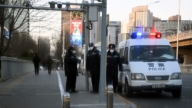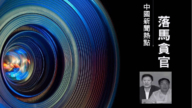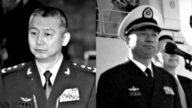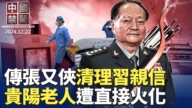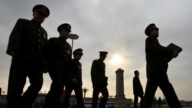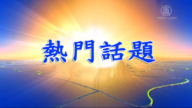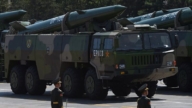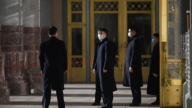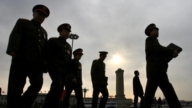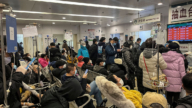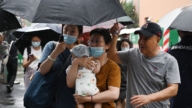【新唐人2012年5月25日讯】世界银行5月23号发布《东亚与太平洋地区经济更新》的报告中,下调对中国年度经济增长率的预估,并表示,单纯依靠国家投资及低附加值商品出口的发展模式,不可持续。中共政府必须减少税赋、增加福利,并且进行“市场化改革”,以刺激“内部消费”。 学者认为,中共当局从来不考虑百姓的利益,现实也让“国富民穷”的政策不会改变。
“世界银行”在报告中说,中国本年度经济增长率的预估从8.4%下调至8.2%,中国经济增速放缓,将导致东亚地区新兴经济成长率降到两年最低点。“世界银行”敦促中国采取“鼓励内需增长”的政策以刺激经济,而不是单纯依靠增加国家投资。
“世界银行”建议的刺激中国内需政策包括“减税、增加社会福利投入”等,并说,这应该是中国金融政策调整的重点。
美国南卡罗莱纳大学艾肯商学院教授谢田:“我觉得世界银行的看法是对的,就是说用减税,增加社会福利支出、其他社会支出,用这个方法,支持消费的财政措施来支持中国经济,这个说法实际上也是以前海内外的学者、经济学家都积极宣导的。从中共本质上来说和中共整个财政状况来说,这个基本上是很难被中共所采纳的。”
现实中,中共采取的措施也与“世行”建议的相反。
24号,多个中共媒体以“国务院:加快建设铁路等重大基础设施项目”主题,要求中国加快对重大基础设施项目的投资。温家宝在主持召开的国务院常务会议上,要求启动一批重大项目投资,鼓励民间投资参与铁路、能源、电信等领域建设等。
温家宝还表示,将加大对国家重点“在建专案”的信贷投放。
谢田指出,对“重大专案投资”不仅会造成通货膨胀,而且也会越来越使得资源、生产资本、财富越来越集中,而且高房价、高通膨、高教育和医疗费用,使全体百姓相对贫困化,这也是“世行”不建议中国“靠投资 换增长”的原因,也是中国内需不旺的原因。
谢田:“中国实际上一直用对重大基础专案进行投资,重点在建项目大量投放信贷,用这个办法来支持中国经济的增长。这个做法的结果,我们知道实际上越来越变得国富民穷。”
“世行”报告还指出,中国投资率已经处于极高水准,无法在不造成社会及环境负面后果的情况下,再进一步大幅提高。
谢田认为,中共从来不愿意在老百姓身上花钱,但目前加大基础建设投资是中共不得不做的事情。
谢田:“基础投资会增加就业,而如果就业上不去或者失业人数太多,会危及中共的政权。尤其在当今状况下,中共政权岌岌可危,政权内斗也好、各派之间纷争处在一个非常关键的状态,而这个时候任何可能危及政权稳定的事情,都是他们不能接受的。”
国务院研究室和社科院联合调查报告指出:截至2011年6月,同年的“公车消费”为9865亿,“公款吃喝”为8963亿,“公费出国旅游”为8800亿,举办各类活动“招待贵客”为8900亿。
全国人大办公厅研究员王锡锌2011年在《新闻1+1》节目中透露:“公款接待、公费出国考察、公车,一年19000亿,占行政开支的60%。”
时事评论员伍凡指出,现在中国出口减少、关税减少、国内市场萧条,收税也减少,加上外资外流,中资外逃,还有天文数字的“三公消费”,经济问题成了死结 。如果不采取“非常手段”来进行彻底的改革,中国的政治、经济问题将会引起中国的大动乱!这已经摆在中国大陆每个人的面前。
采访/陈汉 编辑/宋风 后制/君卓
World Bank Lowers China’s Growth Forecast
The World Bank released its latest report
on East Asia and Pacific Economic Update on May 23.
The report lowers China’s economic growth forecast.
The development model is purely driven by state investment.
Low value-added export is unsustainable.
The report suggests the Chinese Communist Party (CCP)
adopts domestic demand-based stimulative policies.
These policies can cut taxes, increase social welfare
and implement “market-oriented reforms.”
Scholars remark that the CCP authorities inherently ignore
the people’s interests.
Its policy of “enriching the regime while impoverishing
the populace” will remain unchanged, the experts say.
The World Bank report trims China’s economic growth rate
to 8.2% from 8.4% which it previously predicted.
China’s economic slowdown will lead to the lowest
growth rate of emerging East’ economies, says the report.
World Bank urged China to adopt domestic demand-based
policies to push the economy, instead of just boosting the state investments.
The World Bank report suggests some measures:
“Fiscal measures to support consumption,
such as targeted tax cuts, social welfare spending
and other social expenditures, should be viewed as the first priority.”
Prof. Frank Tian Xie (Business, Univ. of South Carolina):
“The World Bank’s view is correct, I think.
Tax cuts, higher social welfare spending and other social
expenditures support consumption, lifting China’ economy.
The same view was held by overseas scholars
and economists over the past years.
CCP will hardly apply such measure considering its nature
and the regime’s holistic financial position."
In reality, the actions taken by the CCP,
are just the opposite.
On May 24, CCP’s media issued an article, “State Council:
Hasten Railway Investments & Major Infrastructure Projects”
Premier Wen Jiabao chaired a State Council meeting,
calling for a number of major project investments to begin.
He encouraged private investments on railways, energy,
telecommunications and other infrastructure constructions.
Wen Jiabao said the regime will increase credit supplies
on the state’s key projects under construction.
Professor Xie comments that “the major project
investments” would cause inflation.
Further, the policy will make resources, productive capital
and wealth increasingly concentrated.
While high house pricing, high inflation, high education cost
and medical treatment will pauperize the populace.
Professor Xie pinpoints this as the reason the World Bank
does not recommend China’s investment-driven growth.
This can also explain China’s stagnant domestic demand,
according to Frank Xie.
Prof. Xie: “China’s heavily invested major infrastructure’
projects have cast a light on projects under construction.
This is the approach they keep applying
to support economic growth.
We’ve seen that in reality the result enriches the regime,
but impoverishes the people more and more."
The World Bank report discusses this issue too:
“Investment rates are already extremely high and
cannot be increased much further without adverse social
and environmental consequences.”
Professor Xie points out that the CCP never willing to
spend money for the wellbeing of the people.
However, there’s no option, the regime have to increase
of infrastructure investment due to the current situation.
Professor Xie: “The infrastructure investment’ increase
could boost job employment. The high unemployment rate would endanger its ruling power.
Especially today, the CCP regime is on the ropes,
with its factional infightings entering a very critical stage.
So at this moment, its top leadership cannot accept
anything that might imperil its ruling stability.”
A joint survey report was made by the State Council
Research Office and the Academy of Social Sciences.
It showed that as of June 2011, the year’s official-purpose
car expenses amounted to RMB986.5 billion.
Official-purpose reception meal expenses: RMB896.3 billion.
Official-purpose traveling abroad spending: RMB880 billion.
Varied activities held for entertaining VIPs
cost RMB890 billion.
A national congress’ office researcher, Wang Xixin
revealed a figure in CCTV’s “News 1+1″ program in 2011.
He said, three official-purpose expenses were “1.9 trillion
a year, accounting for 60% of administrative expenses."
Critic Wu Fan thinks the economic issue
has become a taut knot for the CCP’s regime.
China has fewer exports, dropping tariff income, domestic
market recession, taxation revenue fall and capital outflows.
Plus the astronomical figures
of the three official-purpose expenditures.
Wu remarks that if no reform is carried out, major turmoil
may be triggered by China’s political and economic issues,
“This is the true fact that every Chinese
need to face right now,” says Wu Fan.


